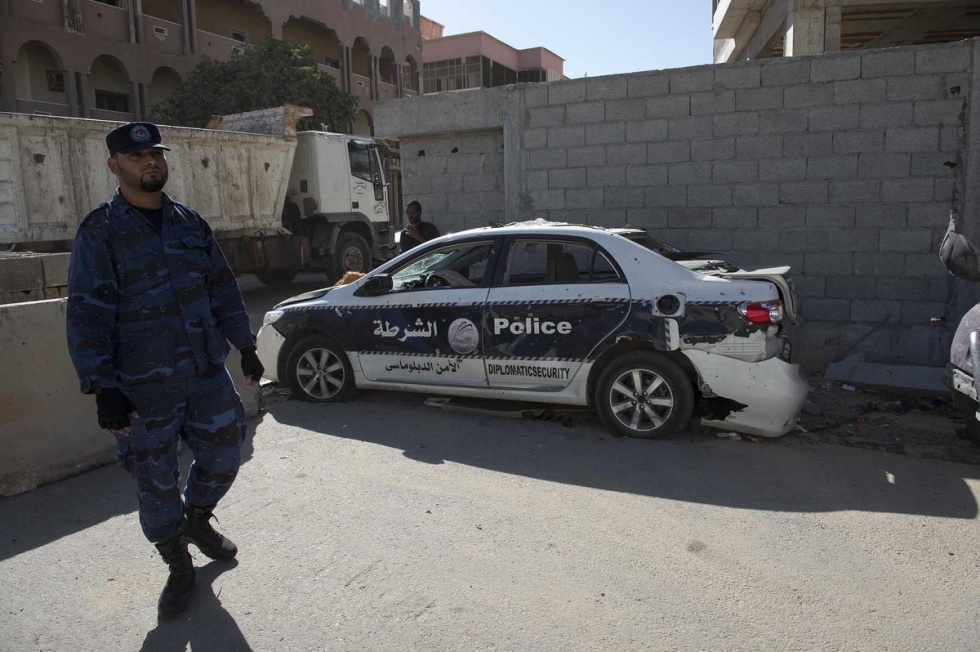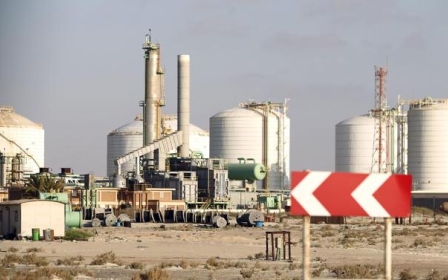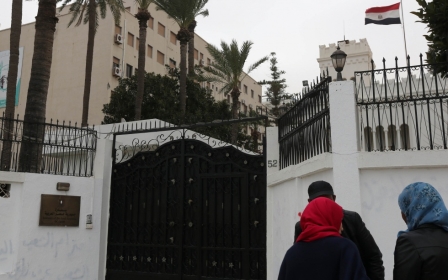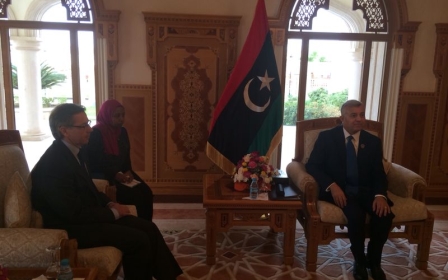Compromise in Libya, a fraught task but not an impossible one

In early October Libya’s Supreme Court ruled that the poor organisation of last year's parliamentary elections made the vote 'unconstitutional'. In doing so it confirmed the total bankruptcy of the political transition process initiated in 2011 with the adoption of a Constitutional Declaration by the National Transitional Council (NTC).
Since August two rival coalitions have been fighting for recognition as the sole legal and legitimate representative of the Libyan people.
On the one side is the government, led by Abdullah al-Thinni, and established in the Eastern city of Tobruk, it is recognised by the international community but exerts no real control over the country. Because of this al-Thinni has been forced to cooperate with Khalifa Hafter, a retired general whose forces earlier this year launched “Operation Dignity,” a wide-scale military operation directed at Islamist groups operating in Eastern Libya - in particular in Benghazi and Dernah.
But many members of Libya's former parliament have disputed the legality of the transfer of power to the House of Representatives. Joined by some of the new parliamentarians, they refuse to recognise the government's authority and have appointed their own rival government under the leadership of Omar al-Hassi, a businessman from Misratah. After Islamist and revolutionary militias from Misratah and other Western cities forced brigades from Zintan out of Tripoli in July, al-Hassi’s government was able to exert control over the capital city and seize government buildings. Yet it remained isolated internationally, and contested domestically.
The Supreme Court’s ruling has made the situation even more confusing; by ending the legal existence of the only institution that had been keeping the process of political transition imagined in 2011 alive, it may have opened the way to further deterioration of the situation.
The risk is now real that the various competing factions will radicalise further. Besides the potential this holds for increased violence, Libya as a unitary state will be more than ever imperilled, as the Eastern and Western parts of the country already seem to be following increasingly divergent paths.
In the East, federalist groups and major tribes may well choose to dissociate themselves from the political and military actors that dominate the West, whom they consider to be merely fighting for power and resources, and not to save Libya and Libyans from extremists and terrorists as they do. While keeping their support for the HoR and the al-Thinni government, they may intensify the military battle against Islamist groups and their allies (extremist or not), probably with increased support – if not direct military intervention – from Egypt.
As for the Islamists and their revolutionary allies in the West – in particular some of the powerful military brigades from Misratah – they may be incented to “purify” the territory they claim to control, and intensify the fighting against all the groups and forces they see as “counter-revolutionaries,” chief amongst which Zintan and its tribal allies.
On both sides, East and West, there is little doubt that the continuing war will lead to the emergence of new “strong men,” or at least help those who have already benefited from the transition and risen to positions of power to consolidate their authority. In such a scenario, the 2011 uprising and subsequent war would have brought nothing but further violence and devastation to the Libyan people, and would have led to the replacement of the Jamahiriyya Leader by a multitude of smaller chiefs, as violent as their predecessor, and as inclined to re-ignite and manipulate the depth of strives and division between communities to serve their own personal interests. Such a risk is real, and it should not be underestimated.
Yet, the Supreme Court’s ruling could also have much more positive consequences, provided that it is envisaged and used as an opportunity to rethink the process of transition initiated in 2011. This would first require acknowledgement by domestic and international actors alike, that this process was built on the wrong basis, and that a fresh start is needed, which would build upon at least some lessons learned.
In Libya - as in many places since the early 2000s - political transitions have been mostly - if not exclusively - grounded in the establishment of processes and institutions considered as the main pillars of democracy: the organisation of free elections and the formation of governments by elected majorities. Political transition, therefore, has been essentially based on competition for power.
In Libya, such competition started and was encouraged as the country had just come out of a civil war, between parties that had little trust - if any - in one another, and which could dispose of large quantities of weapons to support their political claims and race to power. This competition was quick to intensify and sharpen, as the confidence crisis between the various political groups and communities grew deeper. At the end of 2013, it clearly took a military turn, yet nothing was done to curb it. To the contrary, the only response envisaged to put an end to the escalating crisis was the organisation of new elections. Instead of putting an end to the crisis, it has exacerbated it considerably.
The international community now insists on implementation of a national dialogue as the only way out of the crisis. It is indeed only through efforts to build the bases of a consensus between Libyan communities that a chance exists to put the transition back on track and prevent the country from definitively sinking into chaos. What Libyans need today - as they already needed back in 2011 - is more consensus, not more competition. Whatever the feeling we may have when looking at Libya from the outside, building the bases of such consensus - at least minimal, in a first stage, but within a wide range of actors - is not impossible.
Diplomatic efforts have been recently intensifying in view of restoring dialogue between conflicting parties, and the United Nations Special Envoy has multiplied contacts in and outside Libya. While undertaking such efforts, the international community and Libya’s partners should be well aware that what the country needs is not only that a national unity government of some kind be formed, and new elections can be organised in the short run. Such a government would have little chance to last, and it would most probably not succeed in curbing violence throughout the country. What it would probably lead to, however, is to a renewed race towards colonising and dismembering Libya’s fragile institutions, the exclusion and elimination of their adversaries, as well as resource grabbing by the various competing factions.
Implementing a national dialogue that would have a genuine chance to bring violence to an end and to give rise to a new political process agreed upon by most parties poses indeed one crucial question: how do we identify those who will participate in such dialogue?
While this is the dominant view outside Libya, the situation there cannot merely be described as a war of all against all in a country deeply divided and governed first and foremost by tribal allegiances and rivalries. In cities, regions and communities, a multitude of groups and individuals have been mobilising and working in order to bridge gaps between Libyans, build the bases of a national consensus that would allow for further dialogue, and elaborate on a new political framework for governing Libya.
These groups and individuals - whether they are tribal actors, leaders of armed groups, political or civil society leaders - often have real influence and are respected figures in their communities. Yet the political transition initiated in 2011 has not turned them into those “elites” likely to represent the Libyan people at the dialogue table; not always do they have weapons, and they are neither known nor recognised by the international community. Others are invited, considered and regarded as influential by external actors that have - to a large extent - contributed to “create” them.
For any national dialogue to succeed, these unknown, “intermediary” elites must be recognised, heard, and supported. Of course, this requires efforts on the long run and major political involvement on the part of Libya’s partners. Whether these are genuinely willing or even capable of doing such effort is questionable. Yet, merely offering legitimacy to new strongmen who may well quickly turn into new tyrants, or giving in to the sirens of those regional powers that offer to help restore order through military intervention will not contribute to restore civil peace. This is will not either help establish the bases for the rule of law that the large majority Libyans have been calling for since 2011.
-Virginie Collombier is a researcher at the European University Institute of Florence, Italy; associated to the Norwegian Peacebuilding Resource Center (NOREF).
The views expressed in this article belong to the author and do not necessarily reflect the editorial policy of Middle East Eye.
Photo: A damaged police car is seen following an attack carried out with a bomb-laden vehicle near United Arab Emirates (UAE) Embassy in Tripoli, Libya, on 13 November, 2014 (AFP)
Middle East Eye propose une couverture et une analyse indépendantes et incomparables du Moyen-Orient, de l’Afrique du Nord et d’autres régions du monde. Pour en savoir plus sur la reprise de ce contenu et les frais qui s’appliquent, veuillez remplir ce formulaire [en anglais]. Pour en savoir plus sur MEE, cliquez ici [en anglais].





